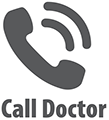Pregnancy & Prenatal Care
Ectopic Pregnancies
An ectopic pregnancy is when an embryo starts to develop outside the uterus. (Ectopic means out of place.) This happens less than 2 percent of the time.
In normal pregnancies, an egg travels from a woman’s ovary to the uterus. It travels down the fallopian tube to get there. Somewhere along the way, the egg gets fertilized by a male sperm. Once inside, the egg attaches to the wall of the uterus. It becomes an embryo and then a fetus. Nine months later, a baby is born.
In ectopic pregnancies, the fertilized egg does not reach the uterus. It starts to grow somewhere else. Most often, that’s in the fallopian tube.
The embryo can’t survive for long outside the uterus. But it can put the mother in danger if it gets too big. It can rupture an organ or cause internal bleeding. Medical steps must be taken right away.
Symptoms
Some women may have no symptoms. They may not even know that they are pregnant. When there are symptoms, they usually come within 8 weeks of conception. Symptoms may include:
• Pain in the lower belly
• Pain on one side of the body
• Vaginal spotting and bleeding
• Pain in the rectum (rear end) or shoulder
• Feeling like throwing up
• Throwing up
• Feeling weak
• Fainting
Diagnosis
Ultrasound can sometimes locate the embryo. Laparoscopy is another option. That’s when a tiny camera with a light is put in the mother’s body. It goes in through a very small incision (cut).

Causes
There are many causes for ectopic pregnancies:
• Damage to the ovary or fallopian tube
• Scarring of the ovary or fallopian tube. Scarring can result from endometriosis, pelvic inflammatory disease or an STD.
Also, the risk for an ectopic pregnancy is higher for women who:
• Have had an ectopic pregnancy in the past
• Have had fallopian tube surgery
• Have had problems getting pregnant
• Have used an IUD for birth control
These women should call their health care provider when they miss a menstrual period.
Treatment
Medicines may be used. But if some time has passed, surgery may be needed. The embryo is removed. Any damage to the mother’s body is repaired. In some rare cases, a fallopian tube or ovary must be removed. But women have another set of these. So the mother may become pregnant again.
Questions to Ask
Question
01
Have you missed one or more periods? Or is there vaginal spotting or bleeding you can’t explain? If one of these is true, do you have any of these symptoms?
• Fainting. Dull or sharp pain in your belly that gets worse
• Sharp pains in your lower belly, rectum (rear end), or shoulder
• Cold skin and you feel faint, weak, or dizzy
• Your belly feels tender and is swollen.

Get medical care without delay. If symptoms are life threatening go to the ER or call 9-1-1. Don’t call 9-1-1 or use the ER if symptoms do not threaten life. Ask your doctor ahead of time where you should go for a problem that needs prompt care, but not emergency care.
x
Question
02
Do you have signs of being pregnant?
• Your breasts feel tender.
• You are sexually active and have missed a period.
• You have an upset stomach or are throwing up.
• You feel dizzy.
• A home pregnancy test says you are pregnant.

Call your doctor or health care provider and state the problem. He or she can decide what you should do.
x
Question
03
Have you missed a eriod and do you use an IUD for birth control?

Call your doctor or health care provider and state the problem. He or she can decide what you should do.
x
Question
04
Are you trying to get pregnant, and have you had any of these problems? Do you have any now?
• Pelvic inflammatory disease or an STD
• Scarring of an ovary or fallopian tube

Call your doctor or health care provider and state the problem. He or she can decide what you should do.
x
Self-Care / Prevention
Tips to Lower the Risk of an Ectopic Pregnancy
• Talk to your health care provider about your risks for damage to your fallopian tubes from:
– STDs
– Pelvic Inflammatory Disease
– Endometriosis
• Ask if you need to get tested for these and how often. Find out, too, if your health plan pays for these tests.
• Schedule any tests needed with your health care provider.

Download an offline pdf file.
RELATED ARTICLES
<
>
2021 © American Institute for Preventive Medicine - All Rights Reserved. Disclaimer | www.HealthyLife.com








